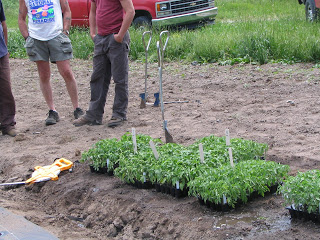Are You Selling Transplants This Year? Do You Know the Rules?
go.ncsu.edu/readext?466726
en Español / em Português
El inglés es el idioma de control de esta página. En la medida en que haya algún conflicto entre la traducción al inglés y la traducción, el inglés prevalece.
Al hacer clic en el enlace de traducción se activa un servicio de traducción gratuito para convertir la página al español. Al igual que con cualquier traducción por Internet, la conversión no es sensible al contexto y puede que no traduzca el texto en su significado original. NC State Extension no garantiza la exactitud del texto traducido. Por favor, tenga en cuenta que algunas aplicaciones y/o servicios pueden no funcionar como se espera cuando se traducen.
Português
Inglês é o idioma de controle desta página. Na medida que haja algum conflito entre o texto original em Inglês e a tradução, o Inglês prevalece.
Ao clicar no link de tradução, um serviço gratuito de tradução será ativado para converter a página para o Português. Como em qualquer tradução pela internet, a conversão não é sensivel ao contexto e pode não ocorrer a tradução para o significado orginal. O serviço de Extensão da Carolina do Norte (NC State Extension) não garante a exatidão do texto traduzido. Por favor, observe que algumas funções ou serviços podem não funcionar como esperado após a tradução.
English
English is the controlling language of this page. To the extent there is any conflict between the English text and the translation, English controls.
Clicking on the translation link activates a free translation service to convert the page to Spanish. As with any Internet translation, the conversion is not context-sensitive and may not translate the text to its original meaning. NC State Extension does not guarantee the accuracy of the translated text. Please note that some applications and/or services may not function as expected when translated.
Collapse ▲
If you sell transplants for commercial use in NC, that means a farmer or anyone else in NC who intends to resell the transplants or the fruit, flowers, etc. produced from them, you must be inspected and you will probably need to be certified as a nursery. If you are selling to a local farmer within a 30 mile radius of where you produced the transplants and he/she has personal knowledge of the conditions under which they were grown, you are exempt from these rules.
If you intend to ship the transplants out of the state, you need to check the requirements of the importing state to determine if a certificate of inspection is required.
If you determine that your plants need to be inspected, you will probably need to get a nursery certificate, too. You will be certified as a REGISTERED nursery (less than one acre in size and does not sell outside the state) or as a CERTIFIED nursery (one or more acres in size or sells outside the state). It costs $20 per year to be a registered nursery and $100 or more per year to be a certified nursery.


